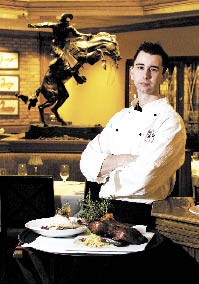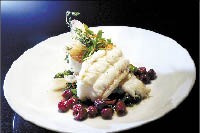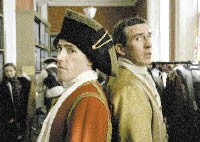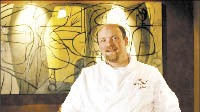There are no two ways about it. The joint appearance in Memphis on Monday of Illinois U.S. senator Barack Obama and Tennessee senatorial candidate Harold Ford Jr. was a huge success for the latter’s campaign. The crowd that greeted the two politicians was large, demonstrative, and liberally sprinkled (no pun intended) with converts to Ford’s cause.
The throng of several thousand that jammed the ballroom of the University of Memphis-area Holiday Inn on Central Avenue was, quite literally, standing room only. It was made up of hundreds of Memphians who had dutifully R.S.V.P’ed to an invitation that had gone out on the local Democratic Party network by e-mail, letter, phone call, and word-of-mouth but included as well several hundred additional attendees who had responded merely to advance news reports of the event.
So obvious was it that an overflow would occur for the affair billed originally as a luncheon, event organizers dispensed with the idea of providing tables for the party regulars and other political-circuit types who thought they had reserved them — and who stood in long check-in lines to get in. Provided instead were finger-food buffet tables at one end of the cavernous room and a few folding chairs next to the stage for early-bird arrivals.
Here and there in the crowd were Democrats who had been skeptical about Ford’s candidacy on ideological grounds — fearing that the Memphis congressman was too cautious or too politically conservative — but were beginning to succumb to what they saw as reality. One such, acknowledging that a Democratic alternative existed in state senator Rosalind Kurita of Clarksville, dismissed those who maintained that Kurita still had a fair chance of prevailing in the party primary, scoffing, “Give us a break!”
That attitude was based in part on financial disclosures showing that Ford had raised upward of $3 million — much of it, as Republican senatorial candidate Bob Corker has recently charged, from outside Tennessee — while Kurita was still well south of her first million. But much of it too, stemmed from an unremitting news focus — including an abundance of statewide and national media accounts — that has been trained on the Memphis congressman.
And, finally, much of the drift to Ford was a consequence of the seemingly obvious fact that Democratic Party officialdom, including the Democratic Senatorial Campaign Committee, had made a conscious decision to put the party’s eggs in Ford’s basket.
One indication of the hierachy’s preference was Obama’s visit on Ford’s behalf, clearly calculated and not too coincidentally timed in conjunction with NBC anchor Brian Williams‘ well-publicized confusion of the two in televised coverage of President Bush’s State of the Union message.
For obvious reasons, both Obama and Ford played off the two-peas-in-a pod metaphor. Once introduced (by local power lawyer Arnold Perl, one of several dignitaries onstage with Ford and Obama), the Illinois senator, who was elected in 2004 and promptly became a national figure, looked out on the large, racially mixed crowd and jested, “I know about half of y’all are related to Harold.” Obama, the son of a Keniyan father and Kansas mother, went on to do send-ups of his own African name, maintaining that he had been called everything from “Alabama” to “Yo’ Mama.”
From there he elaborated on the supposed connection between himself and Ford, laying on the irony at one point: “You can’t elect a black Democrat to the United States Senate. You all heard that, I know.” He recounted his own against-all-odds success in Illinois — even in supposed unfriendly climes like downstate Cairo, Illinois — and concluded with a peroration that owed much to the oratory of Dr. Martin Luther King. “As Dr. King said, the arc of the universe bends toward justice,” Obama said, proclaiming a vision of the fall campaign to come that located Ford’s candidacy within the King tradition. “We put our hands on that arc, and we’re knocking on doors. … Wherever we go, we’re spreading the word about a new young man that’s going to turn it around in Washington.”
He beckoned to Ford — and to thunder from the audience.
And yet there were two ways about it, two distinct personas on display at the Holiday Inn on Monday. There was even an inadvertent irony when Obama, in his introduction for Ford, evoked what he saw as the mission of the Democratic Party in words almost identical to those used on the stump by Kurita. “I am my brother’s keeper,” said Obama, speaking of himself as a Democrat. “I am my sister‘s keeper.”
And, in his catalogue of the “simple values” that animated Democrats, Obama made reference to a series of presumed expectations held by the party’s largely working-class constituency: “They expect [that] if they’re able to do the work, they should be able to find a job that pays a living wage. … They expect that they shouldn’t be bankrupt when they get sick.” And so on.
Obama’s oblique reference to last year’s congressional passage of a strict, loophole-closing bankruptcy bill proposed by the Bush administration, a bill opposed by Obama and by the Democratic leadership in both houses in Congress, constituted an even larger irony. After all, Ford whose 9th congressional district overlaps with what has been called “the bankruptcy capital of America,” had been among the minority of Democrats who had voted for the legislation. This was the vote that, along with Ford’s support of the Iraq war, is often cited by his critics as evidence that Ford is too pliable in relation to the president and his administration.
Even Obama’s concluding point in his characterization of Democrats — “They do think that government can help” — was later counter-pointed in an odd, even awkward way by Ford himself.
Speaking at one point of an impoverished mother he’d met at a campaign stop, Ford said, “She wasn’t complaining to me about her salary, Senator Obama. She wasn’t even complaining to me about the working conditions where she worked. She was complaining basically because of the same reasons why my mom and dad loved me and raised me the way they did, sending me to church every Sunday and making sure I did my homework and wanting me to do better. She wanted the same thing for her kids. And all she wanted to know was, why was government getting in the way, why was government making it harder?”
Like so much of what Ford says on the stump these days, the statement had a political ambivalence that obscured whatever political philosophy lies at its core. Ford continued, denouncing “one group [that] dedicates themselves to finding division, and finding the point of separation and amplifying every moment that can tear us apart and amplifying every moment that forces us to see division where it may exist and encourage division where it doesn’t exist.”
In contrast, Ford designated another group that he said included himself and Obama: “We have to be in the business of uniting and pulling people together. We have to be in the business of not just identifying what’s wrong and yelling loud about it but … working harder to make it right.”
Ford spent much time defending himself and his extended family against a variety of criticism, including “narrow and intolerant and asinine statements” apparently emanating from the media. “I know they write a lot about my family, but they raised us right.”
Identifying himself with “a new generation of leadership,” Ford said his critics were frustrated “because they can’t label me.” Liberals thought he was “too conservative,” he said, while conservatives characterized him as “too liberal.” All he was trying to do, said Ford, was to follow the gospel of Matthew and “take care of the people.”
He concluded with a promise that, regardless of “all that they say about my mama and my daddy and my aunt and my uncle,” he intended to go on to the Senate and “make Tennessee and America a better place.”
When the tumult that followed his remarks died down, Ford and Obama, who had arrived together, went to opposite ends of the room on handshaking and autograph-signing missions before each finally departed to his own separate mission and itinerary.




